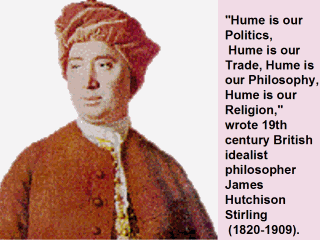 |
Influenced by
John Locke (1632-1704) and Bishop George Berkeley (1685-1753), David Hume
was a Scottish historian and philosopher and developed the notions of
skepticism and empiricism. Hume's skeptical approach also denied
the existence both of the spiritual substances postulated by Berkeley and
Locke's as "material substance." Born in Edinburgh , Hume was educated at
home and at the University of Edinburgh, matriculating at the age of 12.
A Treatise of Human Nature (3
vol., 1739-40) embodies much of his thinking. In France he was lionized by
French literary circles and formed a friendship with the French philosopher
Jean Jacques Rousseau. Hume brought Rousseau back with him to England.
Rousseau, however, plagued by paranoia, accused Hume of plotting against
him. Later, Hume retired to Edinburgh, spending the rest of his life there. |
